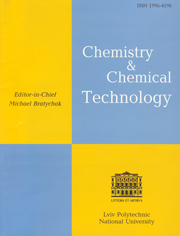Combustion Kinetics of Petroleum Coke by Isoconversional Modelling
| Attachment | Size |
|---|---|
| 361.67 KB |
[1] Vivoda, V.: Energ. Policy, 2009, 37, 4615. https://doi.org/10.1016/j.enpol.2009.06.007
[2] Bayram A., Müezzinoğlu A., Seyfioğlu R.: Fuel Process. Technol., 1999, 60, 111. https://doi.org/10.1016/S0378-3820(99)00041-7
[3] Green P., Martin A.: 2015. Refining Capacity Outlook to 2020: 2015 Developments. Energy Insights. https://goo.gl/KWhmhf.
[4] Global Data: 2017. H1 2016 Global Capacity and Capital Expenditure Outlook for Refineries. Developing Countries Drive Growth in Global Refining Industry. https://goo.gl/P7R28C
[5] Zhang Y., Yao M., Gao S. et al.: Appl. Energ., 2015, 160, 820. https://doi.org/10.1016/j.apenergy.2015.01.009
[6] Nemanova V., Abedini A., Liliedahl T., Engvall K.: Fuel, 2014, 117, 870. https://doi.org/10.1016/j.fuel.2013.09.050
[7] Murthy B., Sawarkar A., Deshmukh N. et al.: Can. J. Chem. Eng., 2014, 92, 441. https://doi.org/10.1002/cjce.21908
[8] Shlewit H., Alibrahim M.: Fuel, 2006, 85, 878. https://doi.org/10.1016/j.fuel.2005.08.036
[9] Chen J., Lu X.: Resour., Conserv., Recy., 2007, 49, 203. https://doi.org/10.1016/j.resconrec.2006.03.012
[10] Malekshahian M., Hill J.: Energ. Fuel., 2011, 25, 5250. https://doi.org/10.1021/ef201231w
[11] Yuan S., Zhou Z., Li J., Wang F.: Appl. Energ., 2012, 92, 854. https://doi.org/10.1016/j.apenergy.2011.08.042
[12] Yoon S., Choi Y.-C., Lee S.-H., Lee J.-G.: Korean J. Chem. Eng., 2007, 24, 512. https://doi.org/10.1007/s11814-007-0090-y
[13] Jayaraman K., Gokalp I.: Appl. Therm. Eng., 2015, 80, 10. https://doi.org/10.1016/j.applthermaleng.2015.01.026
[14] Qian W., Xie Q., Huang Y. et al.: Int. J. Mining Sci. Technol., 2012, 22, 645. https://doi.org/10.1016/j.ijmst.2012.08.009
[15] Yuzbasi N., Selçuk N.: Fuel, 2012, 92, 137. https://doi.org/10.1016/j.fuel.2011.08.026
[16] Patun R., Ramamurthi J., Vetter M. et al.: Clean Fuels Production Using Plasma Energy Pyrolysis System [in:] Ogunsola O., Gamwo I. (Eds.) Ultraclean Transportation Fuels, ACS Publ. 2007. https://doi.org/10.1021/bk-2007-0959.ch003
[17] Zhan X., Jia J., Zhou Z., Wang F.: Energ. Convers. Manage., 2011, 52, 1810. https://doi.org/10.1016/j.enconman.2010.11.009
[18] Munir S., Sattar H., Nadeem A., Azam M.: Energ. Sourc. A: 2017, 39, 775. https://doi.org/10.1080/15567036.2016.1263254
[19] Slopiecka K., Bartocci P., Fantozzi F.: Appl. Energ., 2012, 97, 491. https://doi.org/10.1016/j.apenergy.2011.12.056
[20] Lopez-Velazquez M., Santes V., Balmaseda J., Torres-Garcia E.: J. Anal. Appl. Pyrol., 2013, 99, 170. https://doi.org/10.1016/j.jaap.2012.09.016
[21] Nyakuma B., Oladokun O., Jauro A., Nyakuma D.: IOP Conf. Series: Materials Science and Engineering, 2017, 217(1), 012013.
[22] Nyakuma B., Jauro A.: GeoSci. Eng., 2016, 62, 6.
[23] Nyakuma B.: Bulg. Chem. Commun., 2016, 48, 746.
[24] Nyakuma B., Jauro A., Oladokun O. et al.: J. Phys. Sci., 2016, 27, 1. https://doi.org/10.21315/jps2016.27.3.1
[25] Oladokun O., Ahmad A., Abdullah T. et al.: Appl. Therm. Eng., 2016, 105, 931. https://doi.org/10.1016/j.applthermaleng.2016.04.165
[26] Parvez A., Hong Y., Lester E., Wu T.: Energ. Fuel., 2017, 31, 1555. https://doi.org/10.1021/acs.energyfuels.6b02000
[27] Shen D., Gu S., Jin B., Fang M.: Biores. Technol., 2011, 102, 2047. https://doi.org/10.1016/j.biortech.2010.09.081










